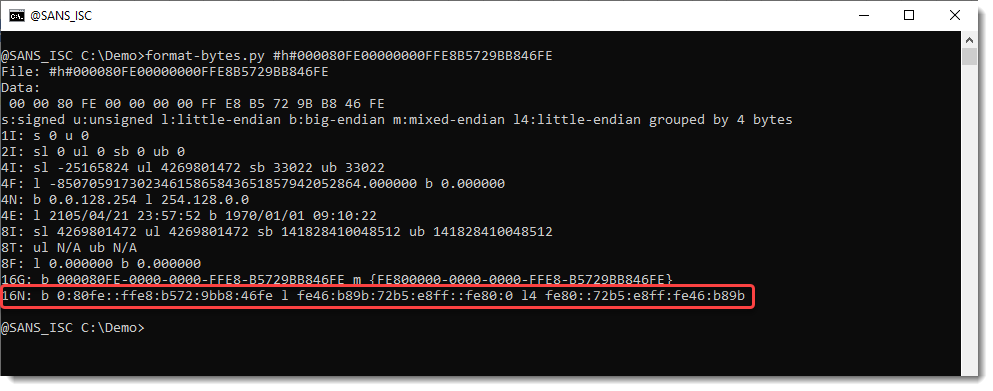Binary IPv6 Addresses
Jim was inspired by my diary entry "IPv4 Addresses in Little Endian Decimal Format" to make a new tool "New tool: le-hex-to-ip.py".
His new tool takes hexadecimal input and dispays it as formatted IPv4 or IPv6 addresses. Jim's new tool inspired me to add IPv6 support to my tool format-bytes.py. This tool takes arbitrary binary input, and interprets it according to many standards and formats. IPv4 is one of them, but not IPv6.

Sequences of 16 bytes were already inerpreted as GUIDs/UUIDs (in big-endian and mixed-endian format), but now IPv6 (16N) is also displayed: big-endian (b), little-endian (l) and the format that Jim described, and that was new to me: a set of 4 consecutive, little-endian unsigned 32-bit integers (l4) (I don't know how this format is called, so I'm abbreviating it as l4: little-enian 4).
Didier Stevens
Senior handler
Microsoft MVP
blog.DidierStevens.com
Wireshark releases 2 updates in one day. Mac users especially will want the latest.
For those of you that use wireshark, they released 4.0.9 and 3.6.17 followed a few hours later by 4.0.10 and 3.6.18 on 4 Oct. According to the release notes the problem was primarily a Mac issue.
-
Error loading g729.so plugin with Wireshark 4.0.9 and 3.6.17 on macOS. Issue 19374.
---------------
Jim Clausing, GIAC GSE #26
jclausing --at-- isc [dot] sans (dot) edu


Comments